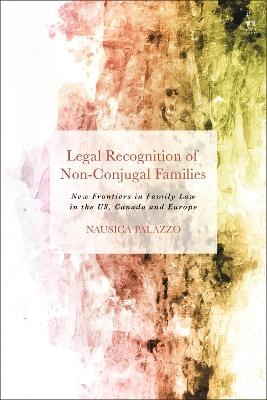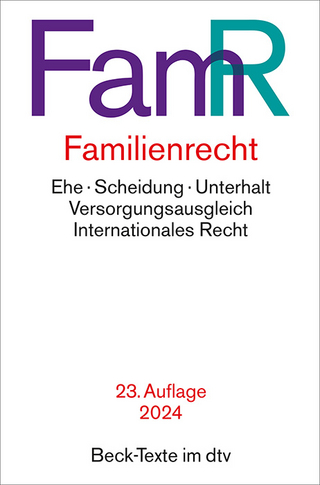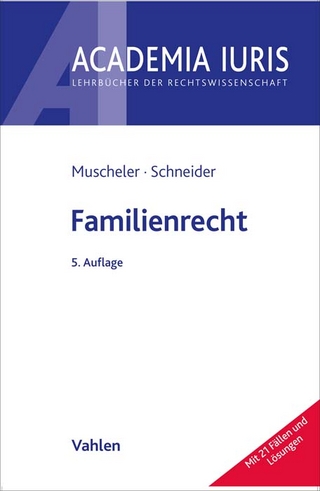
Legal Recognition of Non-Conjugal Families
Hart Publishing (Verlag)
978-1-5099-4724-9 (ISBN)
Part I of the book illustrates recent evolutions in family patterns and norms, and explores how law can accommodate multiple family grids without legal recognition involving normalisation. Part II focuses on courtroom litigation on the basis that courts nowadays are central avenues of social change. It takes non-conjugal families as a case study and provides an analysis of the most compelling argumentative strategies that non-conjugal families can mobilise to pursue legal recognition in Canada and the United States, and within the systems of the European Convention of Human Rights and the European Union.
Through its comparative, interdisciplinary and critical legal method, the book provides scholars, activists and policymakers with conceptual tools to tackle the current invisibility of new families. Further, by advancing legal arguments to enhance the protection of non-conjugal families in courtrooms, the book illuminates the different approaches jurisdictions are likely to take and the hindrances thereof to overcome and debunk stereotypes associated with proper familyhood.
Nausica Palazzo is Assistant Professor in Constitutional Law at NOVA School of Law in Lisbon, Portugal.
PART I
NEW FAMILIES AND LAW-MAKERS
1. New Families
1. What is the ‘New’ Family?
I. Evolution in Family Patterns
II. Evolution in Normative Conceptions of Family
III. Law’s Friction with the ‘New’ Family
2. Methodology
I. Why Legal Strategies?
II. Why Focus on Non-Conjugal Couples?
III. The Comparative Method and Family Law
2. Recognition Models
Introduction
1. Discarded Remedy
I. Marriage
2. Potential Remedies
I. Ascription
II. The Contractual Model
III. Registration
IV. Hybrid Models
Conclusion: A Better Model?
PART II
NON-CONJUGAL FAMILIES BEFORE THE COURTS
3. The United States
Introduction
1. The Changed Landscape of Family Structures and Family Law in the US
2. Venue
I. Constitutional Litigation
II. Family Law Litigation
3. Remedy
I. Constitutional Litigation: An Area-Specific Approach
II. Family Law Litigation: An Area-Specific Approach
4. Legal Arguments in Constitutional Litigation
I. Equal Protection
II. Due Process
III. Freedom of Association
5. Legal Arguments in Family Law Litigation
I. Judicial Updating
II. The Over-Inclusiveness and Under-Inclusiveness of Marriage
Conclusion
4. Canada
Introduction
1. The Changed Landscape of Family Structures and Family Law in Canada
2. Venue
I. Constitutional Litigation
II. Human Rights Litigation
3. Remedy
I. Constitutional Litigation: An Area-Specific Approach
II. Human Rights Litigation: An Area-Specific Approach
4. Legal Arguments in Constitutional Litigation
I. Marital Status Discrimination
II. Family Status Discrimination
5. Legal Arguments in Human Rights Litigation
I. Family and Civil Status Discrimination
Conclusion
5. The European Convention on Human Rights
Introduction
1. The Changed Landscape of Family Structures and Family Law in Europe
I. The Subconstitutional Landscape
II. The Constitutional Landscape
2. Venue
3. Remedy
I. Stage 1: An Area-Specific Approach
II. Stage 2: A Comprehensive Approach (Registration)
4. Legal Arguments before the ECtHR
I. Stage 1: Protection of Family Life and Ban on Discrimination
II. Stage 1: Protection of Property and Ban on Discrimination
III. Stage 1: General Ban on Discrimination
IV. Stage 2: Oliari-Style Protection of Family Life
Conclusion
6. The European Union
1. The EU and Family Law: A Complex Relationship
2. Remedy
I. An Area-Specific Approach
3. The Relevant Jurisprudence of the Court of Justice
I. The Employment Equality Directive
II. Staff Regulations
III. The Citizens’ Rights Directive
Concluding Remarks
Conclusion
| Erscheinungsdatum | 08.04.2021 |
|---|---|
| Verlagsort | Oxford |
| Sprache | englisch |
| Maße | 156 x 234 mm |
| Themenwelt | Recht / Steuern ► Allgemeines / Lexika |
| Recht / Steuern ► EU / Internationales Recht | |
| Recht / Steuern ► Privatrecht / Bürgerliches Recht ► Familienrecht | |
| Sozialwissenschaften ► Soziologie | |
| ISBN-10 | 1-5099-4724-8 / 1509947248 |
| ISBN-13 | 978-1-5099-4724-9 / 9781509947249 |
| Zustand | Neuware |
| Haben Sie eine Frage zum Produkt? |
aus dem Bereich


